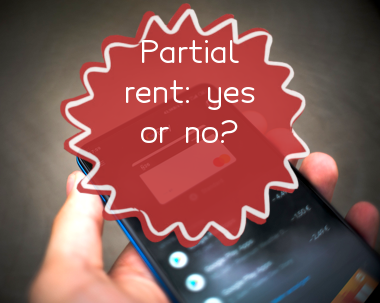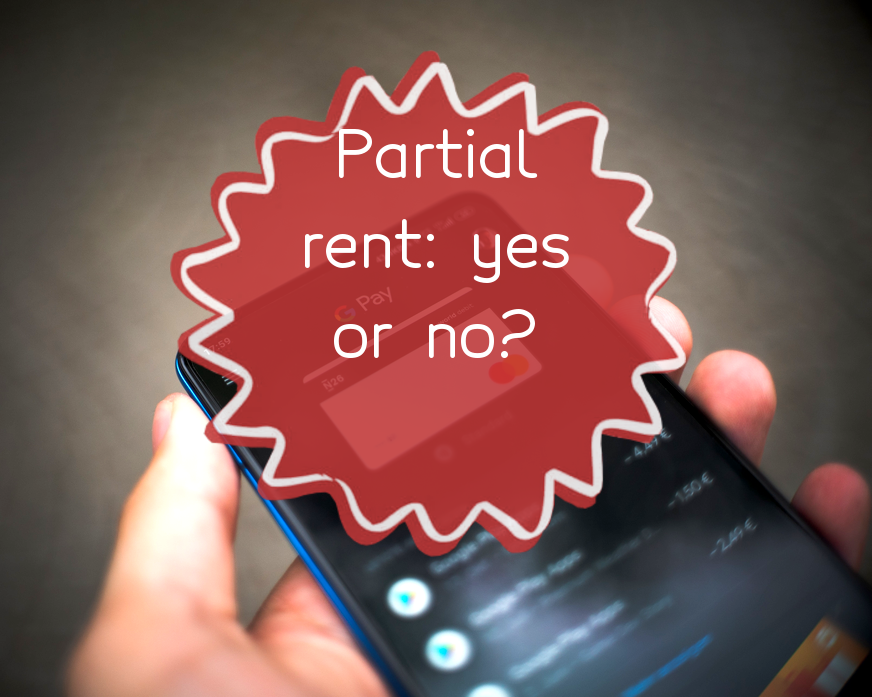Here are some general arguments for and against landlords accepting partial rent payments:
For accepting partial rent payments:
- 1. Helping tenants: Accepting a partial rent payment might be an act of kindness and understanding on the part of the landlord towards the tenant who would otherwise have been evicted. It could be that the tenant is facing financial difficulties, and the acceptance of a partial rent payment could be a lifeline to them.
- 2. Avoiding Vacancies: For landlords who have vacant properties, accepting partial rent payments might be better than having no tenants at all. It could be a way for landlords to retain tenants who might have been unable to pay the full rent due to, say, a job loss or salary reduction.
- 3. Maintaining Good Tenant-Landlord Relationships: Sometimes landlords may want to avoid conflicts with their tenants. Accepting a partial rent payment could demonstrate that the landlord is willing to work with the tenant to find a mutually beneficial solution.
Against accepting partial rent payments:
- 1. Legal Issues: Accepting a partial rent payment may mean that the landlord waives their right to initiate eviction proceedings against the tenant. If the tenant defaults on the next payment, it could be challenging for the landlord to evict them if they accepted a partial rent payment earlier.
- 2. Setting a Precedent: If landlords accept a partial rent payment from one tenant, they may be obligated to accept partial payments from other tenants, and this could cause a significant loss of revenue for the landlord.
- 3. Delaying the Inevitable: If a landlord consistently accepts partial payments from struggling tenants, they may be postponing the day when the tenant has to leave without a solution in place.
In summary, whether landlords should accept partial rent payments or not depends on various factors such as the landlord's financial situation, the tenant's financial situation, the legal framework in place, and the landlord's long-term goals.
Why You Shouldn?t Accept Partial Rent Payments
Here are some reasons why landlords shouldn?t accept partial rent payments:
- 1. It Can Create a Precedent: If a landlord accepts partial rent payments once, it sets a precedent that they are willing to accept anything less than the full amount. This can become a problem for the landlord in the future because tenants may feel entitled to only pay partial rent going forward.
- 2. It Can Cause Financial Strain: Landlords often have their own bills and expenses to pay, and partial rent payments can create financial strain for them. They may have to dip into their own savings or borrow money to make up for the shortfall.
- 3. It Can Make Eviction Difficult: If a landlord accepts partial rent payments, it could make eviction proceedings more difficult should they become necessary. A court could see the acceptance of partial payments as a sign that the landlord is not serious about collecting full rent, and therefore may not have good cause for eviction.
- 4. It Can Be Time-Consuming: Keeping track of partial payments and communicating with tenants about outstanding balances can be time-consuming, especially if multiple tenants are involved. It can also create confusion and potential for disputes.
- 5. It Can Undermine the Lease Agreement: The lease agreement is a legally-binding document that outlines the terms of the tenancy, including the rent amount and payment schedule. Accepting partial payments goes against the terms of the lease and can undermine the validity of the agreement.
What to Do If You Receive a Partial Rent Payment
But here are some general steps that one may follow if they receive a partial rent payment:
- 1Notify the tenant: Contact the tenant and inform them that they have only made a partial payment, and ask them for the reason behind it.
- 2Discuss a payment plan: If the tenant has a legitimate reason for the partial payment, you can discuss a payment plan with them to cover the remaining balance over a set period of time.
- 3Follow up: Its important to follow up with the tenant regularly to ensure that they are keeping up with the payment plan and that the remaining balance is paid off in full.
- 4Consider eviction: If the tenant is repeatedly late with rent or consistently fails to make full payments, you may need to consider eviction as a last resort. However, make sure you adhere to legal procedure and consult with a lawyer or landlord-tenant association.
Make It Easier on Your Tenants by Accepting Credit Cards
Accepting credit cards as a form of rent payment can make it easier on your tenants in many ways. Here's how:
- 1Convenient Payment Platform: Providing tenants with an online payment portal simplifies the rent payment process. Tenants can access the portal whenever they want and easily pay their rent with a credit card. This also eliminates the need for tenants to visit the bank or mail a check.
- 2Flexibility: Accepting credit cards allows tenants to pay their rent at any time, and they don't need to worry if they don't have the rent amount available in their bank account. They can use their credit card and pay it off over time.
- 3Rewards: Some credit cards offer rewards and cashback on every purchase, which can be beneficial for tenants who choose to pay their rent via their credit cards. By offering credit card payments, you are giving tenants the opportunity to earn rewards, which will encourage them to pay their rent on time.
- 4Security: When tenants pay using a credit card, you are guaranteed to receive payment on time as long as the credit card payment goes through. Plus, credit card payments are secure and discrete, ensuring tenants' payment information is protected.
- 5Reduced Late Payment Fees: By accepting credit cards, tenants will pay on time more frequently, which reduces the late payment fees you have to charge. This, in turn, will make it easier on your tenants by avoiding extra fees and improving their financial stability.
In conclusion, accepting credit cards can make it much easier for tenants to pay their rent, streamlining the payment process, increasing flexibility, and reducing fees and late payments. By offering this payment option, you make it easier for tenants to manage their finances and stay on top of their payments, improving your relationship with them in the long run.
Rules When You Do Accept Partial Rent Payments
In general, the following may be considered as some rules for accepting partial rent payments:
- 1Written Agreement: If you decide to accept partial rent payment, you should create a written agreement that outlines the payment schedule, the amount to be paid each time, and the consequences for failing to meet these terms. Both parties should sign the agreement.
- 2Communication: It is critical to maintain open communication with the tenant regarding the payment plan. Ensure that the tenant understands the terms and the timeframe for making payments. You may also consider having them give you a reason for their inability to pay the full amount.
- 3Consistency: You should apply the same rules and principles to all tenants. Do not show favoritism to one tenant over another, as this could lead to discrimination claims.
- 4Late Fees: If your lease agreement outlines late fees, ensure that the tenant is aware that these fees will still apply to partial payments.
- 5Eviction: If the tenant does not pay the full amount or consistently fails to meet the payment schedule, you should follow the standard eviction process according to your state laws.
- 6Keep Records: Be sure to keep proper records of the partial payments, the payment schedule, and any communication between you and the tenant about the payments. This will help you keep track of the outstanding balance and serve as evidence if there are any disputes in the future.
It is important to keep in mind that accepting partial payments from tenants is risky and may lead to undesirable outcomes. Therefore, consider if this is the best course of action for your situation, and if not, explore other possible options.
Final Thoughts
Based on the general consensus from experts and stakeholders, the decision to accept partial rent payments may vary depending on the specific circumstances of the tenant and property. Some landlords believe that accepting partial rent payments can help maintain a good relationship with the tenant and prevent eviction, while others argue that it can set a dangerous precedent and make it harder to maintain financial stability for the property. Ultimately, landlords should review the lease agreement, determine their financial needs, and consider potential consequences before deciding to accept partial rent payments. It is also important for landlords to communicate openly with their tenants and seek resources or assistance if needed to avoid financial strain or legal issues.
Just one more thing: if you liked the article, please like us on social media and share this article with friends.



